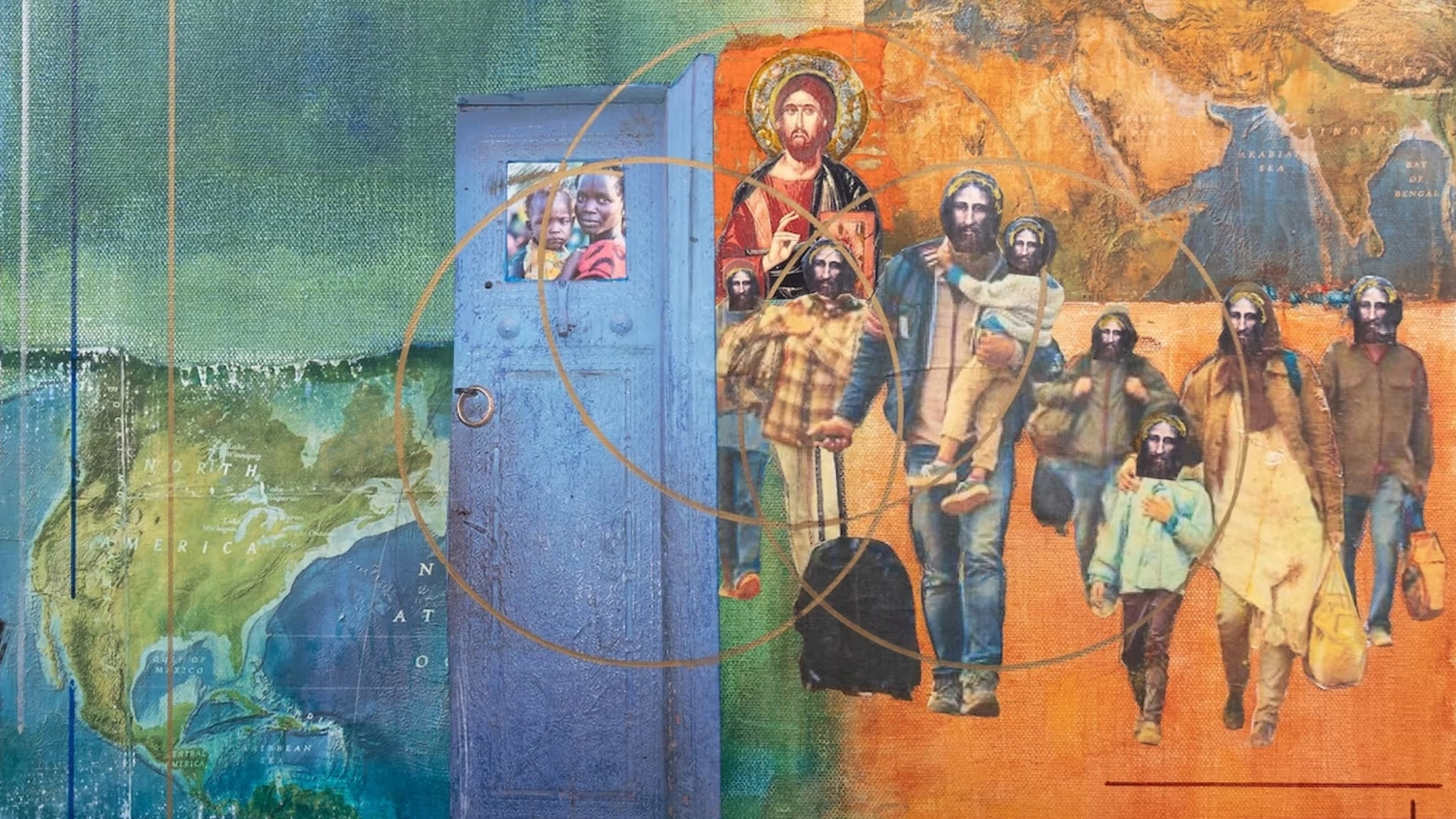A mother discovers
the depths of God’s creation
through the language of her son.
By Danielle Ng | June 5, 2017
I have always liked words. As a child I was a voracious reader. In college I majored in English literature and biblical studies. I am fascinated with how words create meaning. Especially in poetry, I enjoy being exposed to the creative use of language, the way poets posed common things in a new light, and how even one writer’s experience can reflect universal truths about the human experience.
Christian writer Brian Doyle has a poem titled “What Do Poems Do?” in which he describes a visit to a kindergarten classroom where the children posed questions to him, such as “Is that your real nose?” and “Can you write a book about a ruffed grouse please?” One question, in particular, stood out to him: “What do poems do?” He spends the next several lines answering:
They are built to slide into you sideways. You have poetry slots
Where your gills used to be, when you lived inside your mother.
If you hold a poem right you can go back there. Find the handle.
Take a skitter of words and speak gently to them, and you’ll see.
I think Scripture is like poetry in this regard. Like Doyle’s “poetry slots,” I think we have “Scripture slots” that were created in us while we were in the womb. Have you ever had that almost supernatural experience of reading Scripture and having it jump off the page or come alive in front of you—as if it has been written just for you? It can be eerie and exhilarating at the same time. That’s when it’s going into our “slots.”
Recently, when reading the words of Psalm 19, I had a moment when the words of Scripture “slid into me sideways.”
My middle child, Adam, who is seven, has autism spectrum disorder. You may know that communication, among other things, is a challenge for individuals with autism. Some on the spectrum are completely nonverbal, whereas others are verbal and “higher-functioning.” My son is somewhere in the middle. He doesn’t speak a whole lot. He most definitely cannot have a conversation and will not respond if anyone—even me—says hello to him. However, he can read and type, and we often communicate that way. He has definite academic gifts, but I admit it’s sometimes difficult for me to gauge how much he actually comprehends. He is not great at answering higher-order thinking questions, and his ability to engage in back and forth dialogue is limited.
We first received Adam’s diagnosis three years ago, and I have been processing it ever since. Early on, as I researched autism and treatments, I learned that there is some controversy over whether autistics needed “fixing.” Currently the generally accepted advice is to get autistic kids into various therapies at a young age.
But I have read some articles by adult autistics who present a different view. They write that behavior therapy does more harm than good, that it is really about getting them to conform to accepted behavioral norms that would make non-autistics feel more comfortable around them. In their view, autism is simply another way of being, which does not need to be cured—it is neither good nor bad. These articles were written by nonverbal autistics who were once thought to be limited in their cognition, but who later learned to communicate via typing on a computer and were finally able to express themselves.
All of this was swirling around in my head, when I heard someone present a devotional on Luke 4, the passage where Jesus reads Isaiah 61 in the synagogue and says to the people that the Scripture has been fulfilled in their hearing. In this text, Jesus is saying that he has been anointed to restore Israel, to bring healing to its people, to usher in a new age. Obviously, as part of his ministry Jesus healed a vast number of people, including some who were mute—people who were perhaps like my son. And I was left to reconcile this. Jesus’s self-identity was about healing and restoring. But what if my son didn’t need fixing, and what if that never happens anyway? Should I pray for healing, or should I accept the situation because hoping for a cure would send the message that I want my son to be different than who he is?
Should I pray for healing? Does hoping for a cure send the message that I want my son to be different than who he is?
In short, what does restoration look like?
For clues, I look to the resurrected Jesus, who was alive but still bore the scars of his crucifixion. It wasn’t as if his wounds never happened, but they had been transfigured. They were and are an integral part of who he is. This informs my thinking. My son and the nature of my relationship with him are affected by his lack of words. For example, I touch Adam more often than I do my two other children, who are neurotypical. With my other kids, I certainly touch them, but I can communicate my thoughts and feelings to them with words. With Adam, verbal communication is difficult, so instead I find myself stroking his hair or his arms, or cuddling with him, or just sitting next to him. He also relies on me for comfort quite a bit, so we have bonded in that way. My relationship with him is different and special because of his nonverbalness.
Our bodies affect our spiritual development, our personalities, the way we experience God and others. Do I try to pray away the thing that might make my son who he is? I don’t know. I am still working out the implications of all of this.
“Word and language are the means by which humans enter into an intellectual relationship with their environment, especially with their fellow humans,” writes one theologian. “A word or a concept is, for the ancients, a means of ordering phenomena and ideas, and at the same time a bridge for communication, and a way of gaining mastery or influence. …Because words, as the shape and form in which one expresses one’s thinking, count as one of the highest distinguishing characteristics of human beings, the Bible also speaks of the self-communication of God in the category of the word in such an all-embracing way that any tension with the activity of God is excluded.” God’s word and his activity are one and the same.
Throughout Scripture, the theme of the word—spoken and written—is prominent. God created the world by speaking it into existence. The Torah, the words of God—the law, spoken to Israel—are written down for the people. Jesus Christ, the Logos, is the incarnate Word of God. Paul announces in Romans 10:9 that “if you declare with your mouth ‘Jesus is Lord’ and believe in your heart that God raised him from the dead, you will be saved.” On Pentecost, tongues of fire rested on the believers and the speaking in tongues was a sign of the working of the Spirit.
But what do we do when we have no words? What if our ability to read, speak, or understand words is compromised? What becomes of our “poetry slots” in that case? Can we still experience the Word of God?
And then I encountered the words of Psalm 19. “The heavens declare the glory of God; the skies proclaim the work of his hands. Day after day they pour forth speech; night after night they reveal knowledge. They have no speech, they use no words; no sound is heard from them. Yet their voice goes out into all the earth, their words to the ends of the world” (vv. 1-4).
Psalm 19 offers us a way to connect with God when our own words are scarce. The psalmist is saying that God speaks for us through the work of his very word, that is—his creation. This also brings to mind Paul’s words in Romans 8—that all of creation is groaning, waiting for the redemption of our bodies, and that the Holy Spirit himself intercedes for us through wordless groans when we do not know what to pray for.
I used to practice yoga. Each session would end with corpse pose, which is basically lying flat on one’s back. But it’s more than just resting or dozing or relaxing. It is about total release. The instructor would tell us to think of ourselves as being supported by the earth as we lay there. For me, that was a helpful image. I didn’t have to try to control or manage the pose. My job was to get out of the way and let the earth support my body. I did not have to do anything. The floorboards and the earth beneath it were doing all the work. I was totally supported and therefore I could completely let go.
I think Psalm 19 invites us to do that. If I have any good news for you today it is this:
By all means, use your voice. Use your words to proclaim the glory of God, to sing songs of praise, to wail in lament and argue it out with God, to speak the gospel to a neighbor, to speak words of love and affection to others. Don’t take your words for granted.
But if there comes a time when there are no words—due to illness, injury, despair—allow God’s good creation to support you, to speak for you.
Perhaps, like the resurrected Jesus, these are transfigured words. Mysterious words, beyond our understanding but still real. Perhaps on that day when you have no words, you can let go and allow the earth to support you. The world is your prayer. It can do the praising for you. It is the provision and grace of God.














